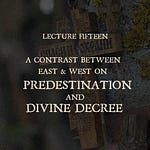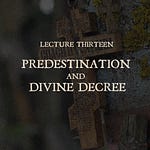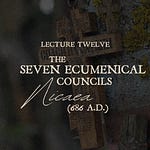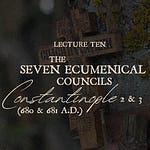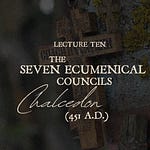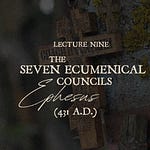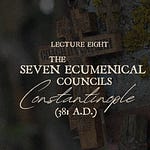These are transcripts from a spoken lecture. The audio is attached to this lesson. If there is any confusion from reading the transcript, please refer to the audio for clarification.
In this current session, we are moving through a history of predestination and divine decree in western Latin theology. As I’d mentioned at the outset of this three-part session, we’re really looking at this not so much because we’re interested in the doctrine of predestination itself. What we’re interested in is how the western concept of God-world interaction develops. As we’ll see, as I had pointed out in the opening of the previous lecture, over time, the discussion of predestination moves us more and more toward a picture of divine transcendence, where God and world seem less and less connected, where more and more it seems that God is outside the world, decreeing things from afar. Ultimately, in modern philosophy, there is a question of whether God is involved at all, giving rise to deism, and then eventually on the heels of deism, atheism.
That’s really our concern: to draw out the evolution of that picture of God-world interactions, and then ultimately, we’ll contrast this with the way the Eastern fathers understand God-world interactions in our next session.
Up to this point, we’ve seen the ways in which predestination was developed in the early pre-Augustine Latin Church Fathers, and we saw that it was a rather simple, straightforward doctrine. It was simply that God foreknows a person’s disposition or their merits, and on the basis of that foreknowledge, he either predestines them to salvation, or alternatively, predestines the rewards that they might receive for responding to him.
It’s really in Augustine that we begin to see a full-blown development of a system of merits, an idea that we have order of loves, the idea that that order of loves is corrupted by the fall, a doctrine of original sin and original guilt, and the ways in which God’s free choice of giving prevenient grace to fix these loves and produce merits and His foreknowledge all interact.
What we’re going to see today is the ways in which the scholastics, the medieval scholastics, on the heels of Augustine, continue to develop this discussion and make it even more nuanced than Augustine himself did.
One of the things I want to do here as we move into the medieval discussion is start by contextualizing this with a certain set of concerns that arise regarding fate. This is really where we left off last time. I had mentioned that Augustine has a sympathy for what’s called divine essentialism, the idea that essential properties are those properties that can’t be otherwise. They’re essential to the nature of the thing. And I use the example of a square. A square has certain essential properties. It has four sides. The sides are equal length. Those can’t be otherwise, because they are essential to what it is.





